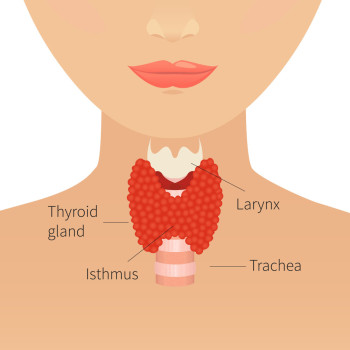Underactive thyroid (hypothyroidism) Mate repe tenga
Your thyroid is a gland in your neck that produces hormones. Sometimes it does not make enough, which slows down your all your body functions (your metabolism). This can lead to a range of symptoms.
Causes of an underactive thyroid
Your thyroid produces 2 thyroid hormones — tri‑iodothyronine (T3) and thyroxine (T4). These help your body use energy and stay warm. They keep your brain, heart, muscles and other organs working as they should.
Some people develop an underactive thyroid meaning they do not produce enough thyroid hormone. The commonest cause is a condition called autoimmune thyroiditis or Hashimoto's disease.
Your immune system usually fights off infection but when you have an autoimmune disease, your immune system attacks your own cells. Your body makes a tiny protein (antibody) that attaches to your thyroid, stopping it from making enough thyroid hormone. We do not know what triggers this, but it sometimes runs in families. It is more common in women and people over the age of 50.
Treatment for an overactive thyroid (hyperthyroidism) or thyroid cancer can sometimes make your thyroid underactive.
In rarer cases, hypothyroidism may be caused by:
- medicines such as lithium or amiodarone
- a lack of iodine
- problems with your pituitary gland (a small gland at the base of your brain that produces hormones that stimulate your thyroid gland)
- giving birth.
Location of your thyroid gland

Symptoms of an underactive thyroid
If you have an underactive thyroid you may:
- feel tired
- have a low mood or be depressed
- feel cold
- be constipated
- have dry skin and hair
- gain weight without changing your diet.
These symptoms generally come on slowly over months or even years so it can take a long time to realise something is wrong.
If you are pregnant and your underactive thyroid is not treated, it can cause problems such as preeclampsia and premature labour.
Diagnosing an underactive thyroid
Your healthcare provider will arrange a blood test to measure your thyroid hormones and TSH (thyroid stimulating hormone).
TSH is a hormone that controls how much thyroxine you make. It is made by your pituitary gland at the base of your brain. If your thyroid is not making enough thyroxine, your TSH will be high.
Understanding your thyroid function resultsexternal link
A blood test can also check for thyroid antibodies (a protein attacking your thyroid cells).
Slightly underactive thyroid
If you have a slightly raised TSH level but normal T3 and T4 levels, it means your thyroid is slightly underactive but still able to produce enough hormones. This is known as subclinical hypothyroidism.
Subclinical hypothyroidism may get worse and develop into an underactive thyroid.
Tell your healthcare provider if you develop the symptoms of an underactive thyroid. You should also have blood tests every 6 to 12 months to monitor your thyroid hormone levels.
If your TSH remains raised or you develop symptoms, your general practice team may suggest starting thyroxine tablets.
Treating an underactive thyroid
You can take a thyroxine tablet daily to replace the thyroxine your body is not making.
Your dose will start low and increase until your blood test shows you are on the right dose. Most people will need to take thyroxine for the rest of their life. If your underactive thyroid happened after giving birth, you may not need to stay on the treatment.
Because thyroxine tablets replace what your body naturally produces, it is rare to have any side effects. If you take too much thyroxine, you can get symptoms of an overactive thyroid. These include sweating, anxiety, shakes and heart racing.
Self care
Take your thyroxine regularly. It is best to take your tablet about the same time each day in the morning.
Avoid taking iron, calcium, or magnesium supplements and multivitamins within 4 hours of taking thyroxine. They reduce the amount of thyroxine that gets into your blood.
If you are taking levothyroxine there is no need to take iodine supplements or kelp products.
Have regular blood tests at least once a year to check that you are still on the right dose of thyroxine.
Many websites offer advice on what foods to eat or not eat with thyroid disease. But there are no specific foods or dietary supplements that you can use to treat your thyroid disorder. Eating a variety of foods is the best way to ensure your body gets all the nutrients it needs.